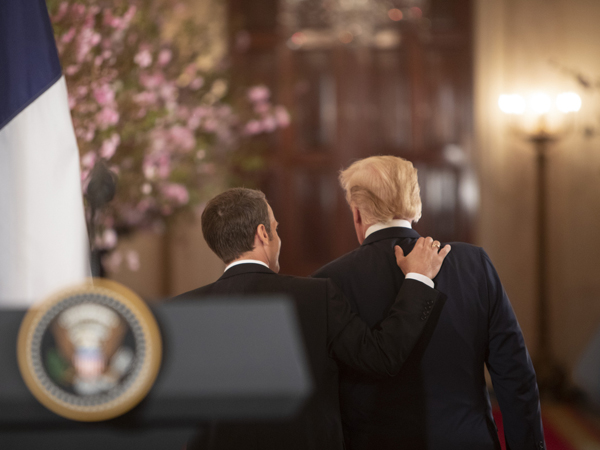
On Wednesday, French President Emmanuel Macron addressed the U.S. Congress. The speech was the finale of his three-day visit to the U.S., which was closely followed by the media. The media presented this story as the meeting of two leaders with radically divergent opinions who were nevertheless able to reach an agreement. The ability to negotiate must first and foremost be attributed to Macron who, in following with this story, must have deftly manipulated the “impulsive” American president, Donald Trump.
The Financial Times stipulates that Macron addressed Congress in English. Throughout his speech, he criticized the fashion for “strong powers” to reject freedom and the “illusion of nationalism.” In addition, he spoke in favor of a new, more detailed deal with Iran, which, on the one hand, would maintain the status quo, and on the other, would calm the Trump administration down. In particular, he discussed the importance of abiding by international agreements, and gave France as an example: France, he said, has no plans to abandon the deal, even though it was developed under the country’s previous leadership.
In general, throughout his three-day visit, The Financial Times notes that Macron showed constant admiration for how “wonderful” France’s relations are with the U.S., but at the same time, he emphasized adherence to the enlightened principles on which, he said, politics must be built. One of these principles is an openness to international cooperation, and in particular, joint efforts in the fight against villains who would threaten democracy by disseminating fake news.
The BBC writes that Macron gave an example for all other world leaders on how to handle Trump. The trick is to flatter as much as possible, and then when the time is right, to unleash a targeted attack on a controversial position. In addition, the author writes, Macron made an elegant attack against Britain when he referred to Franco-American relations as “special,” a status previously reserved for U.S.-British relations alone.
The main part of the rhetoric in the statement before Congress contained long-winded praise of the principles of the American administration, followed by the identification of contradictions in their practical application. For example, Macron borrowed Trump’s slogan “Make America Great Again,” and suggested applying it to the whole world (“Make Our Planet Great Again”).
The author believes that this speech was very important for Congress. Macron stood before them as a world leader, offering an alternative approach to global politics, an approach that competed with Trump’s own approach. At the same time, Macron is nevertheless building a very positive relationship with Trump. The author views this as genuine political virtuosity.
There are no elections for the leaders of the “liberal world order,” writes CNBC. This order was built after World War II, and the U.S. played the lead role in its formation and cultivation. But now, the U.S. has competitors. At the very least, Macron in his speech was clearly asserting leadership. He did this with rhetoric alone, but he was convincing.

Leave a Reply
You must be logged in to post a comment.